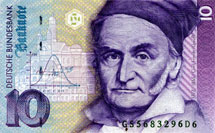

The German 10-Mark note (pre-Euro) featured Carl Friederich Gauß and his equation describing the “normal curve” of probability distribution.
What is clear, beyond all scholasticism is this:
The taming of chance and the erosion of determinism
constitute one of the most revolutionary changes in the history of the
human mind. I use the word ‘revolutionary’ not as a scholar
but as a speaker of common English. If that change is not revolutionary,
nothing is. That is the real justification for talk of a Probabilistic
Revolution 1800-1930.
Hacking, Ian. “Was There a Probabilistic Revolution 1800-1930?”, in Kruger, L. et al eds. The Probabilistic Revolution: Volume 1, Ideas in History, MIT Press 1987, p. 54.

